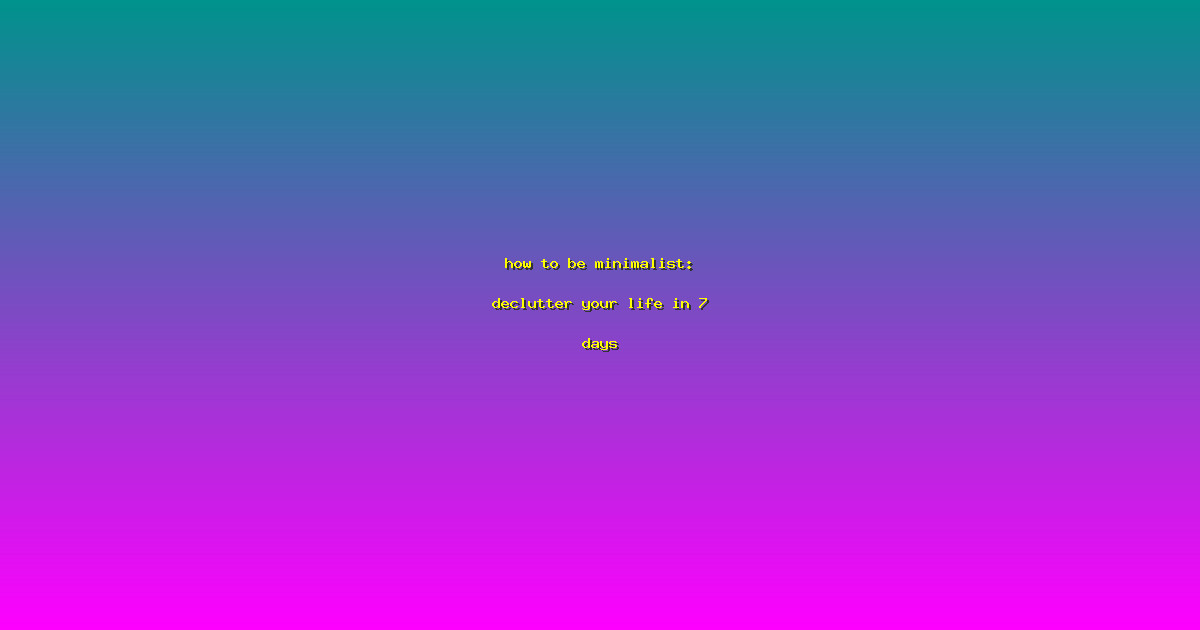how to be minimalist: declutter your life in 7 days
Imagine waking up every morning in a space that feels light, airy, and free of clutter. This isn’t just a dream; it’s a reality that can be achieved through the minimalist lifestyle. If you’re feeling overwhelmed by the sheer amount of stuff in your life, it’s time to embrace the art of minimalism. In just seven days, you can transform your living space and mindset. This guide will walk you through the process of how to be minimalist, providing practical steps and expert insights to help you declutter and simplify your life.
Understanding Minimalism
Minimalism is more than just a trend; it’s a lifestyle that focuses on reducing clutter and simplifying your life. According to a survey by the National Association of Productivity and Organizing Professionals, 70% of people feel more productive and less stressed in a clutter-free environment. By adopting a minimalist approach, you can create a more peaceful and organized living space.
- Key Point 1: Minimalism is about quality over quantity. Instead of accumulating more items, focus on the things that truly add value to your life.
- Key Point 2: Real-world example: Marie Kondo, the decluttering expert, has helped millions of people transform their homes by focusing on items that “spark joy.”
- Key Point 3: Expert insight: “Minimalism is not about deprivation; it’s about making room for what truly matters,” says Joshua Becker, founder of Becoming Minimalist.
Day-by-Day Plan to Declutter
Implementing a minimalist lifestyle doesn’t have to be overwhelming. By breaking down the process into manageable steps, you can gradually declutter your space and simplify your life. Here’s a day-by-day plan to help you get started:
- Day 1: Assess Your Space – Begin by taking a thorough inventory of your belongings. Identify areas that feel cluttered and overwhelming. This could be your closet, kitchen, or office.
- Day 2: Sort and Categorize – Organize your items into categories such as keep, donate, sell, or throw away. Be honest about what you truly need and use.
- Day 3: Declutter Your Digital Space – Don’t forget about digital clutter. Delete old emails, unsubscribe from unnecessary newsletters, and organize your digital files.
Embracing a Minimalist Mindset
Minimalism isn’t just about physical decluttering; it’s also about adopting a minimalist mindset. This involves letting go of material possessions and focusing on what truly brings you joy and fulfillment.
- Key Point 1: Case Study: Sarah, a freelance writer, found that by decluttering her home and digital space, she was able to focus more on her work and personal relationships.
- Key Point 2: Expert Quote: “Minimalism is about creating space for what matters most,” says Courtney Carver, author of “Becoming Minimalist.”
- Key Point 3: Implementation Steps: Start by setting aside time each day to focus on one area of your home. Gradually, you’ll see the positive impact on your mental and emotional well-being.
Frequently Asked Questions
How do I start decluttering?
Begin by setting clear goals and creating a plan. Start with one room or area at a time, and focus on sorting items into categories such as keep, donate, sell, or throw away. Be honest about what you truly need and use.
What are the benefits of minimalism?
Minimalism can lead to reduced stress, increased productivity, and a greater sense of peace and contentment. According to a study by the Journal of Environmental Psychology, people who live in cluttered environments report higher levels of stress and lower levels of well-being.
How do I maintain a minimalist lifestyle?
Maintaining a minimalist lifestyle involves regular decluttering and being mindful of new purchases. Set aside time each month to reassess your belongings and ensure they align with your minimalist goals.
Is minimalism just about getting rid of things?
While decluttering is a key aspect of minimalism, it’s also about creating space for what truly matters. This includes focusing on relationships, experiences, and personal growth.
Can minimalism help with mental health?
Yes, minimalism can significantly improve mental health. By reducing clutter and simplifying your life, you can experience lower stress levels and increased focus and productivity.
Conclusion
Embracing minimalism is a transformative journey that can lead to a more peaceful and fulfilling life. By following this guide on how to be minimalist, you can declutter your space and simplify your life in just seven days. Remember, minimalism is not just about getting rid of things; it’s about creating space for what truly matters. Start today and experience the benefits of a minimalist lifestyle. Begin your journey to a clutter-free life and a clearer mind.
